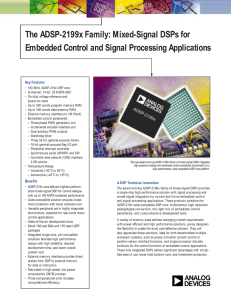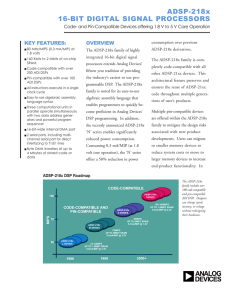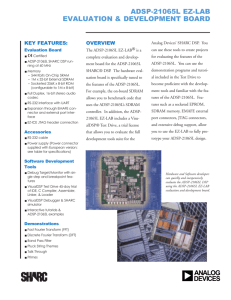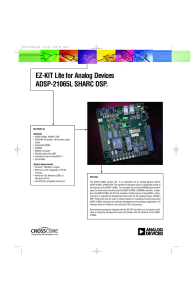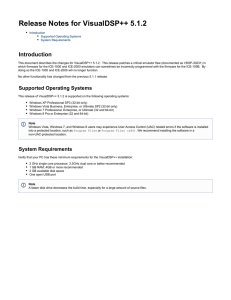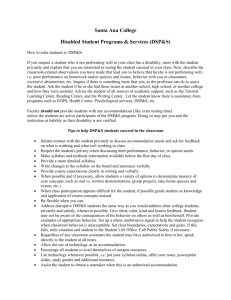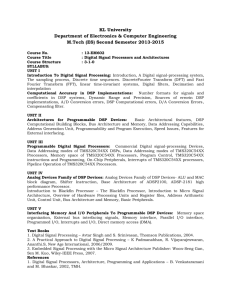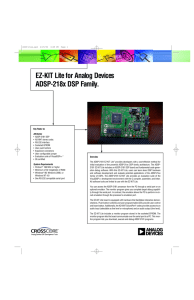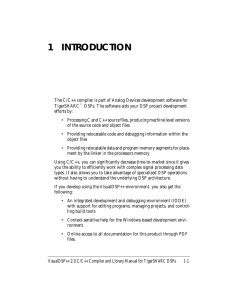ADSP-2191 16-Bit Fixed-Point DSP OVERVIEW KEY FEATURES:
advertisement
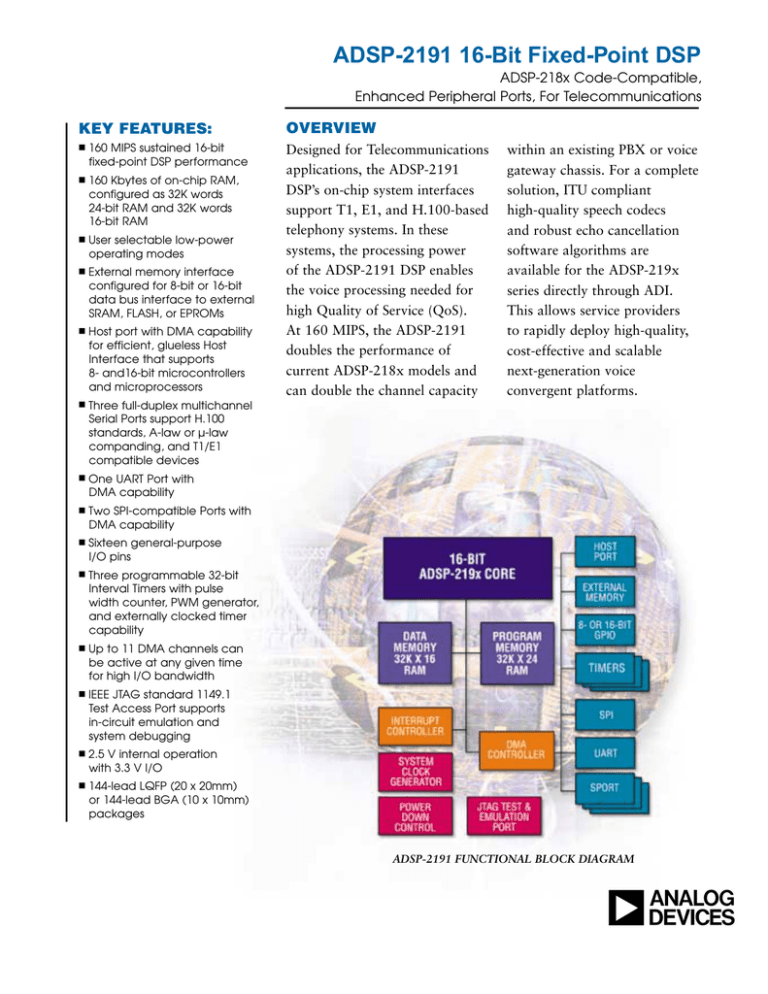
ADSP-2191 16-Bit Fixed-Point DSP ADSP-218x Code-Compatible, Enhanced Peripheral Ports, For Telecommunications KEY FEATURES: OVERVIEW ■ 160 MIPS sustained 16-bit fixed-point DSP performance ■ 160 Kbytes of on-chip RAM, configured as 32K words 24-bit RAM and 32K words 16-bit RAM ■ User selectable low-power operating modes ■ External memory interface configured for 8-bit or 16-bit data bus interface to external SRAM, FLASH, or EPROMs ■ Host port with DMA capability for efficient, glueless Host Interface that supports 8- and16-bit microcontrollers and microprocessors Designed for Telecommunications applications, the ADSP-2191 DSP’s on-chip system interfaces support T1, E1, and H.100-based telephony systems. In these systems, the processing power of the ADSP-2191 DSP enables the voice processing needed for high Quality of Service (QoS). At 160 MIPS, the ADSP-2191 doubles the performance of current ADSP-218x models and can double the channel capacity ■ Three full-duplex multichannel Serial Ports support H.100 standards, A-law or µ-law companding, and T1/E1 compatible devices ■ One UART Port with DMA capability ■ Two SPI-compatible Ports with DMA capability ■ Sixteen general-purpose I/O pins ■ Three programmable 32-bit Interval Timers with pulse width counter, PWM generator, and externally clocked timer capability ■ Up to 11 DMA channels can be active at any given time for high I/O bandwidth ■ IEEE JTAG standard 1149.1 Test Access Port supports in-circuit emulation and system debugging ■ 2.5 V internal operation with 3.3 V I/O ■ 144-lead LQFP (20 x 20mm) or 144-lead BGA (10 x 10mm) packages within an existing PBX or voice gateway chassis. For a complete solution, ITU compliant high-quality speech codecs and robust echo cancellation software algorithms are available for the ADSP-219x series directly through ADI. This allows service providers to rapidly deploy high-quality, cost-effective and scalable next-generation voice convergent platforms. ADSP-2191 FUNCTIONAL BLOCK DIAGRAM a Serial Ports ALGORITHMS Vocoders Description Peak MIPS Voice Coders – (Choice of speech compression algorithms) G.723.1 G.729/A G.728 G.726 G.722 G.711 18.9 19.9/10.8 29 9.7 12.9 0.2 Adaptive 1 ■ ■ ■ Auxillary Jitter Buffer Support for T1/E1/H.100 standards. Support for up to 24-, 32- and 128-channel Time Division Multiplexing A-law or µ-law companding in accordance with ITU recommendation G.711 Synchronous serial communications with peripheral devices and other DSPs/MCUs Configurable for 3- to 16-bit word lengths Tone Detection Voice/Fax/Data System 2.5 ■ Echo Cancellation G.165/G.168 4.5 VAD Voice Activity Detection Serial Peripheral Interface (SPI) CS Call Progress Caller ID DTMF E&M Signalling CS CS <1 <0.5 Signal Detection & Generation ■ ■ Two full-duplex SPI ports for communication with multiple SPI-compatible devices Integrated DMA master, configurable to support both transmit and receive data streams CS: Customer specific (Provided on request) UART MEMORY Internal Memory ■ ■ ■ ■ 32K x 24 words of Program Memory and 32K x 16 words of Data Memory Unified Program and Data Memory space for high efficiency compiler Dual-purpose Program Memory for dual operand fetches in a single cycle External Memory Interface ■ ■ ■ Configurable data bus provides an 8- or 16-bit interface to External Memory Address translation and data word packing provided to support an 8- or 16-bit External Data Bus Adjustable external clock rate allows interface to low cost memory devices PERIPHERALS Host Port Interface ■ ■ Full-duplex asynchronous serial data transfer bit rates from 9.5M to 6.25M bits per second Timers ■ ■ ■ ■ ■ Three 32-bit general-purpose timers Individually programmable for generating periodic interrupts Pulse Waveform Generation Pulse Width Count/Capture External Event Watchdog mode System Clock Generator and Power Management ■ ■ ■ Optional crystal oscillator or clock source inputs Programmable PLL supports 1X to 32X frequency multiplication. Enables full-speed operation from low-speed input clocks or crystals User selectable idle modes significantly reduces the power dissipation for power constrained applications 16-bit Host Port that lets External Hosts read from or write to the entire DSP’s memory space, boot space, or internal I/O space Configurable for 8-bits to provide a glueless interface to low cost microcontrollers The Analog Devices logo, VisualDSP, and the VisualDSP logo are registered trademarks of Analog Devices Inc. VisualDSP++, and EZ-KIT Lite are trademarks of Analog Devices Inc. ©Analog Devices, Inc., 2001. All rights reserved. Printed in U.S.A. H02468-5-4/01 (A) DEVELOPMENT TOOLS ■ ■ ■ ■ ADSP-2191 is supported by a complete set of software and hardware development tools including VisualDSP++™, evaluation boards and JTAG emulators. VisualDSP++ integrated development and debug environment (IDDE) features a C/C++ compiler, statistical profiling and the new VisualDSP® Kernel (VDK). All designed to make software development faster. ADI makes it easier to evaluate the ADSP-2191 for a specific application with the ADSP2191-22 EZ-KIT Lite™ evaluation system. The EZ-KIT Lite includes an ADSP-2191 DSP evaluation board and software. JTAG emulators available for PCI, USB and Ethernet host platforms provide easier and more cost-effective methods for engineers to develop and optimize DSP systems, shortening product development cycles for faster time-to-market. DSP SUPPORT: Email: In the U.S.A.: dsp.support@analog.com In Europe: dsp.europe@analog.com Fax: In the U.S.A.: 1 781 461-3010 In Europe: +49-89-76903-307 Web Address: http://www.analog.com/dsp WORLDWIDE HEADQUARTERS One Technology Way P.O. Box 9106 Norwood, MA 02062-9106, U.S.A. Tel: 1 781 329 4700 (1 800 262 5643 U.S.A. only) Fax: 1 781 326 8703 Worldwide Web Site: http://www.analog.com EUROPE HEADQUARTERS Am Westpark 1-3 D-81373 München, Germany Tel: +89 76903-0; Fax: +89 76903-557 JAPAN HEADQUARTERS New Pier Takeshiba, South Tower Building 1-16-1 Kaigan, Minato-ku, Tokyo 105, Japan Tel: +3 5402 8210; Fax: +3 5402 1063 SOUTHEAST ASIA HEADQUARTERS 4501 Nat West Tower, Times Square Causeway Bay, Hong Kong, PRC Tel: +2 506 9336; Fax: +2 506 4755 a
